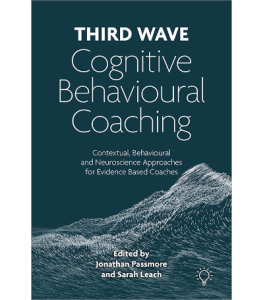Third Wave Cognitive Behavioural Coaching

Author:
JONATHAN PASSMORE is a chartered psychologist, executive coach, coaching supervisor, author and professor of coaching. He has written widely with thirty books and more than a hundred scientific articles and book chapters. He was recently ranked in the world’s top eight coaches by Thinkers 50. Previously director of the Henley Centre for Coaching, University of Reading, he is now Senior VP at the global coach firm CoachHub.
SARAH LEACH is a Lecturer in Coaching and Behavioural Change at Henley Business School, University of Reading. As an experienced Executive Career and Life Coach, she runs her own practice drawing on ten years of corporate experience in the utility sector, leading and enabling business change. She is a contributing author to several books, including ‘The Coaches’ Handbook’ (2020).
Briefly:
The book is aimed at coaching practitioners, especially those looking to work in evidence-based ways and to add flexibility and rigour to their coaching practice. The book is also suitable for those on postgraduate and/or accredited coaching courses progressing beyond introductory models towards more advanced practice.
Description:
Coaching is an emerging discipline that is continually exploring new frontiers. An area of particularly fertile ground is cognitive behavioural therapy (CBT). Developed from behavioural roots by integrating cognitive models of behaviour, and since developed in a range of directions to place increased value on individuals’ histories, emotions and potential, CBT offers a host of interrelated, evidence-based approaches that draw on psychology and our knowledge of the brain to help people cope with psychological challenges. Adapting cutting-edge psychological science to the needs of a coaching audience, Third Wave Cognitive Behavioural Coaching shows how, by drawing on techniques from Acceptance and Commitment Therapy (ACT), Dialectical Behaviour Therapy (DBT), Schema Therapy (ST) and more, coaches can adopt a more holistic approach that takes account of the problem, the context and the unique individual.

